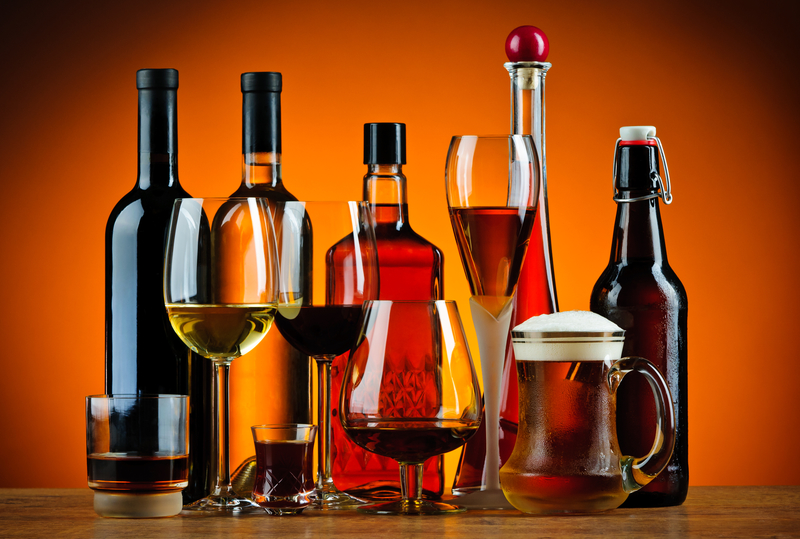Can You Drink Alcohol While on Your Diet?

The short answer is probably no. Alcohol and diet don’t mix. Sorry for being a buzzkill.
Okay, the real answer is a lot more nuanced—and a lot depends on the diet. For example, a glass of wine with dinner is typically considered a healthy part of the Mediterranean Diet.
So, “it depends.”
Of course, that’s only part of the answer. The most important part of the alcohol and diet equation is you and your behavior. That is, what are your drinking habits like? Do you stop at one (or two at most), or once you start, do you decide you might as well finish the bottle (or growler, or six pack, or fill-in-the-blank vehicle that delivers your beverage of choice)?
Do you skip alcohol throughout the week and save up for some big nights on the weekends? (Binge drinking isn’t just an issue in college; adult binge drinking is a serious problem.) And when you’re drinking, how does that affect what and how much you eat?
Answers to questions like those matter a lot more than the diet you choose because there are lower-calorie, lower-carb alcoholic beverages that can fit into a low-carb or keto diet, for example. (We’ll get to those later in this blog post.)
As Socrates and Plato shared, it’s important to first know yourself. If you find yourself drinking more than you know you should (which, in case you’ve forgotten, is just one drink if you’re a woman and two drinks if you’re a man under 65), then it isn’t part of any healthy diet.
While a 5-ounce glass of wine or 12 ounces of beer (better make it a good craft beer!) occasionally to once-a-day may do little damage (and may even have some benefits), for many, it’s a habit that grows, and damaging effects can add up, especially over time.
Detriments of Drinking Too Much
Some of the detriments of drinking too much alcohol include:
• Changes to the Brain. The immediate brain changes—such as changes in mood and behavior—make it harder to think clearly and coordinate movement. With longer term drinking, it can lead to changes in how the brain looks and works, including brain shrinkage.
• Decreased Inhibitions. While it may typically be easy to walk away from that second serving or to skip the unhealthy options, once alcohol is on board, the brain has a tougher time with control and may even urge you to “go ahead and indulge.” Yep, alcohol can not only lead to increased calories from the alcohol but can cause you to overeat.
One serving of alcohol can contain anywhere from 100 to 200 (or more, depending on the vehicle) calories, and those calories add up. And if you go for a mixed drink with added tonic, juice, syrups, etc., you’ll add even more calories. Yet interestingly, research has found the alcohol itself causes minimal weight gain—rather, it appears decreased inhibitions that can lead to overeating are what interfere with reaching weight-loss goals.
• Weakened Immune System. Want to become an easier target for disease? Nope? It turns out that even a single heavy drinking session can reduce your body’s ability to fight off infections for up to 24 hours after your drinking binge.
• Reduced Quality of Sleep. While an evening cocktail may make you drowsy and help you go to sleep faster, there’s a good chance you won’t sleep as well. By getting less REM sleep, your body gets less of a chance to recover. This also means you miss out on important phases of sleep involved in learning and memory consolidation. No wonder why some people can’t remember what happened on a night involving drinking. Plus, you might find yourself with more frequent visits to the bathroom, which is also disruptive to a good night’s sleep.
• Upset Stomach. Two common reactions to a heavy night of drinking are diarrhea and heartburn.
• Hangover. A night of drinking can leave your body dehydrated and expand the blood vessels in your brain and body, causing, you guessed it, that hangover headache, nausea, and even vomiting along with weakness and the shakes. No wonder it’s called the brown bottle flu.
• Decreased Strength and Muscle Mass. By messing with calcium in the body, regular drinking can prevent your body from building new bones, leading to osteoporosis. And forget the notion that drinking with buddies is the ideal post-workout solution. Heavy drinking leads to muscle weakness and atrophy, as research shows that alcohol can blunt the body’s normal anabolic (i.e., building) response to exercise. It can also lead to muscle cramps.
• Heart Damage. With prolonged drinking or even just a single heavy night, the heart also experiences changes like an irregular heartbeat, cardiomyopathy, high blood pressure, and even increased risk of stroke.
• Liver and Pancreas Damage. Drinking too much can lead to inflammation of the liver, leading to such dangerous issues like fatty liver, alcoholic hepatitis, fibrosis, and cirrhosis. Alcohol also causes the pancreas to up its production of enzymes that can lead to dangerous and painful inflammation of the pancreas as well as disrupt gut health, negatively affect digestion, and even eventually lead to diabetes.
• Increased Cancer Risk. “There is a strong scientific consensus of an association between alcohol drinking and several types of cancer,” according to the National Institute of Alcohol Abuse and Alcoholism. These include increased risk of head and neck cancers, esophageal cancer, liver cancer, breast cancer, and colorectal cancer.
I’m sorry to say that this isn’t even the full list of detrimental effects. Drinking to excess can lead to blackouts (where you permanently lose memory), sexual disfunction and infertility, malnutrition, diabetes complications, tingling and numbness in the hands and feet (indicating nervous system damage), slurred speech, fatigue, birth defects, violence, depression, and anxiety, and as you may have witnessed a time or to, it can also deeply interfere with relationships.
So, it’s clear that heavy and prolonged drinking is not good for your health or any type of diet.
But what if you can easily stick to just one or two drinks and really do just want a glass of wine or craft beer with dinner or a cocktail when you’re out catching up with friends? Now that you’re focused on eating healthier, are there any benefits to responsible drinking?
It appears so.
The Benefits of Mild to Moderate Drinking
Sorry if I sound like a broken record, but “moderate” drinking is scientifically defined as just one to two drinks per day. And no, that doesn’t mean saving up and having six in one night (that’s called binge drinking and comes with all the previously mentioned detrimental effects).
As Paracelsus explained, “The dose makes the poison.” That’s as true with alcohol as with anything else.
For example, according to research from the American College of Cardiology, “Light and moderate alcohol intake might have a protective effect on all-cause and CVD-specific mortality in U.S. adults.” On the other hand, “Heavy or binge drinking was associated with increased risk of all-cause and cancer-specific mortality.”
So, what are the possible benefits of light to moderate intake?
- Social tonic when combined with friends
- Relaxation after a stressful day
- Improved digestion
- May promote the health of the heart and circulatory system and reduce the risk of heart disease
- May protect against type 2 diabetes
- May protect against gallstones
It is worth noting, however, that if you’re normal weight, have an active lifestyle, don’t smoke, and eat a nutrient-dense diet, the benefits of alcohol, especially for heart health, appear to be pretty slim at best.
But at the end of the day, it’s up to you to know yourself and your drinking habits to determine the benefits to risks.
The Effects of Alcohol and Diet on Weight Loss
It shouldn’t come as much of a surprise that alcohol can negatively impact weight loss—especially if you’re trying to lose those last stubborn pounds. Here’s why:
• Alcohol is a source of empty calories—a 12-ounce beer has around 155 calories while a glass of wine provides 125 calories. If you have several drinks, you can be adding several hundred calories to your diet without much, if any, nutritional benefit.
• Alcohol is a preferred fuel source—when on a diet, one of the main goals is to get your body to burn body fat for fuel. Unfortunately, when you’ve consumed alcohol, your body uses those calories first, then moves on to burning carbs, and only after all those calories are burned does it move onto fat. In other words, if you’ve been drinking, there’s a good chance your fat cells will be left untouched.
• Not surprisingly, higher intakes of alcohol are associated with greater abdominal fat storage. Yep, the ol’ beer belly. Interestingly, while that’s true for drinking intensity (i.e., how much), drinking frequency tends to be associated with less belly fat (at least when it’s limited to one glass of alcohol per day).
• Alcohol can negatively impact sleep, and we know how important sleep is to weight loss.
• Alcohol can decrease nutrient absorption.
What Alcohol to Drink on a Diet?
With all of this being said, you don’t necessarily need to completely cut alcohol out of your diet. Many people have been able to successfully lose weight even when drinking moderately. (It might be a good idea to cut the drinking, though, when you’re starting a new diet program or trying to drop those last few stubborn pounds.) And for most people, it’s a good idea to at least cut back. And for everyone, it’s important to stay aware of how much you’re drinking and the effects it has on your body (and your choices, habits, and lifestyle). Then you can adjust as needed.
What alcohol do you drink on a diet? Ditch the high-calorie, high-sugar concoctions (think, drinks that usually come with umbrellas) and consider these lower-calorie options instead:
Distilled alcohol:
- Vodka: 100 calories in 1.5 ounces
- Whiskey: 100 calories in 1.5 ounces
- Gin: 115 calories in 1.5 ounces
- Tequila: 100 calories in 1.5 ounces
- Brandy: 100 calories in 1.5 ounces
It you’re looking for keto-friendly drink options, including wine and cocktails, here are a few to choose from.
If you’d rather skip the cocktail or wine and prefer to go for a beer, here is a list of the healthiest beer to drink.
Whether we’re looking at after-work cocktails, a beer on the weekend, or what diet best fits your lifestyle, mindfulness can be your best friend. Look at yourself, your choices, and your goals honestly. Then you can decide if alcohol and diet ultimately work for you and your lifestyle.







